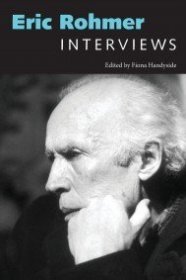
现货Eric Rohmer: Interviews[9781496802507]
¥ 248 九五品
库存2件
作者Handyside, Fiona
出版社University Press of Mississippi
ISBN9781496802507
出版时间2015-01
装帧平装
纸张其他
页数244页
正文语种英语
上书时间2024-03-28
- 最新上架
商品详情
- 品相描述:九五品
- 商品描述
- The 1969 film Ma Nuit chez Maud (My Night at Maud's) catapulted its shy academic film director, Eric Rohmer, born Jean-Marie Maurice Scherer (1920-2010), into the limelight and sold over a million tickets in France, earning a nomination for an Academy Award. Ma Nuit chez Maud remains his most famous film, the highlight of an impressive range of work examining the sexual, romantic, and artistic mores of contemporary France, the temptations of desire, the small joys of everyday life, and sometimes, the vicissitudes of history and politics. Yet Rohmer, who became one of the most significant forces in French New Wave film, was almost fifty years old when Maud was released and had already enjoyed a career as the editor of Cahiers du Cinéma. The interviews in this book offer a range of insights into the theoretical, critical, and practical circumstances of Rohmer's remarkably coherent body of films. They also allow Rohmer to act as his own critic, providing an array of readings concerning his interest in setting, season, color, and narrative.Alongside the application of a theoretical rigor to his own films, Rohmer's interviews also discuss directors as varied as Jean-Luc Godard, Marcel Carné, Jean Renoir, and Alfred Hitchcock, and the relations of film to painting, architecture, and music. This book reproduces little-known interviews alongside detailed discussions from Cahiers and Positif, many produced in English here for the first time.Fiona Handyside, Exeter, United Kingdom, is lecturer in European film studies at University of Exeter. Her work has been published in numerous journals including Studies in French Cinema, Film/ Literature Quarterly, and French Cultural Studies.
相关推荐
-

ERIC ROHMER L A M I DE MON A M I E 外文版 馆藏 盖章
九品北京
¥ 55.00
-

正版现货新书 六个道德故事 9787559638984 (法)埃里克·侯麦(Eric Rohmer)
全新北京
¥ 36.06
-

正版 六个道德故事 (法)埃里克·侯麦(Eric Rohmer) 9787559638984
全新天津
¥ 27.66
-

DVD-侯麦:早期作品集 Eric Rohmer(D9+D5)
九品上海
¥ 32.00
-

六个道德故事 外国现当代文学 (法)埃里克·侯麦(eric rohmer)
全新北京
¥ 33.15
-

【全新正版包邮】六个道德故事(法)埃里克·侯麦(Eric Rohmer)
全新南京
¥ 36.06
-

六个道德故事 外国现当代文学 (法)埃里克·侯麦(eric rohmer) 新华正版
全新保定
¥ 33.60
-
![现货Eric Olafson: Midshipman[9783947234349]](https://www0.kfzimg.com/sw/kfz-cos/kfzimg/17733071/59d6c964e31336d6_s.jpg)
现货Eric Olafson: Midshipman[9783947234349]
九五品上海
¥ 165.00
-

eric rohmer: les jeux de l amour du hasard et du discours【24开外文原版如图实物图】
八五品北京
¥ 108.00
-
![现货Eric Fischl: Ten Breaths[9783866781160]](https://www0.kfzimg.com/sw/kfz-cos/kfzimg/17733071/d635e5d9d29ad82a_s.jpg)
现货Eric Fischl: Ten Breaths[9783866781160]
九五品上海
¥ 371.00
— 没有更多了 —
![现货Eric Rohmer: Interviews[9781496802507]](https://www0.kfzimg.com/sw/kfz-cos/kfzimg/17733071/06091e9a50874419_b.jpg)

![现货Materials and Technologies of Modern Production[9783036401683]](https://www0.kfzimg.com/sw/kfz-cos/kfzimg/17733071/5fd2824531e165d7_s.jpg)
![现货Introduction to Container Ship Operations and Onboard Safety[9781032155425]](https://www0.kfzimg.com/sw/kfz-cos/kfzimg/17733071/58b7ff43ef7909ee_s.jpg)
![现货Electrophosphorescent Materials and Devices[9789814877343]](https://www0.kfzimg.com/sw/kfz-cos/kfzimg/17733071/18cc1d77bcb7b488_s.jpg)
![现货Organic Semiconductors for Optoelectronics[9781119146100]](https://www0.kfzimg.com/sw/kfz-cos/kfzimg/17733071/24c85a750c708964_s.jpg)
![现货Advances in Food Rheology and Its Applications[9780081004319]](https://www0.kfzimg.com/sw/kfz-cos/kfzimg/17733071/e0c11603c9119d4d_s.jpg)
![现货Advanced Materials and Sustainable Technologies[9783035727562]](https://www0.kfzimg.com/sw/kfz-cos/kfzimg/17733071/dced675333874c48_s.jpg)
![现货Advanced Materials and Manufacturing Engineering II[9783035712681]](https://www0.kfzimg.com/sw/kfz-cos/kfzimg/17733071/660ccfae75fa8d3e_s.jpg)
![现货Materials in Machinery and Construction[9783035718119]](https://www0.kfzimg.com/sw/kfz-cos/kfzimg/17733071/6f402060775e9daa_s.jpg)
![现货Cereal Grain Quality (Softcover Reprint of the Original 1st 1996)[9789401071772]](https://www0.kfzimg.com/sw/kfz-cos/kfzimg/17733071/f93ca1c96a97403a_s.jpg)
![现货Eric Rohmer: Interviews[9781496802507]](/dist/img/error.jpg)
以下为对购买帮助不大的评价